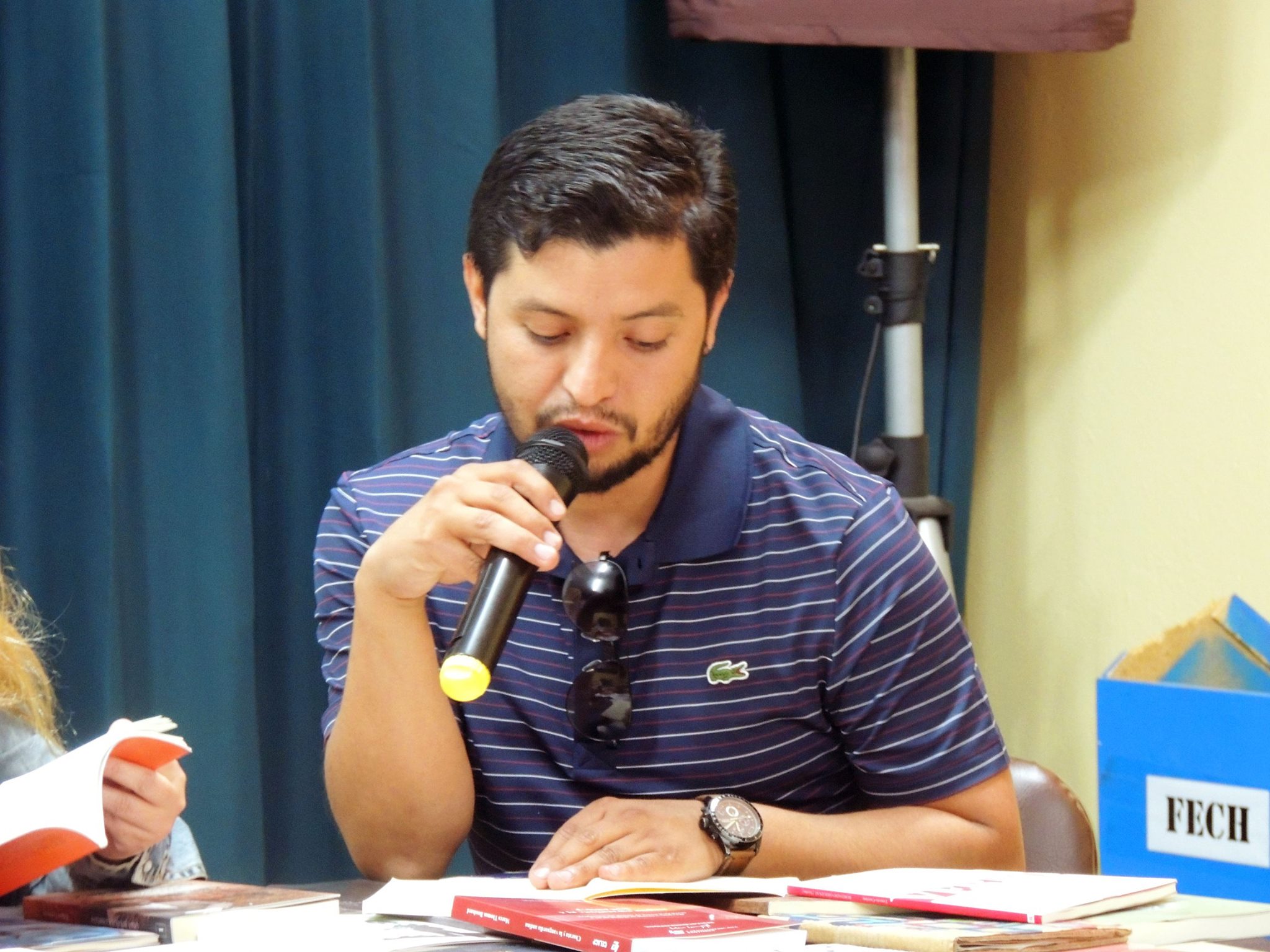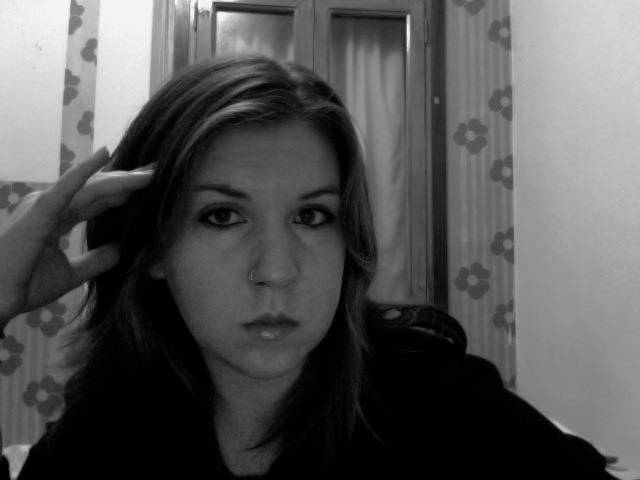Poetry from Hábitat del Camaléon
Folklore is Not the Original Music
[The light must be turned on to see the day.
The wind will carry away the body’s shell.
And all will continue on its course.]
You once wished for a god to come to your gathering.
But you are a common man, a son of the earth.
A black eye in the asphalt.
Your town’s song was composed from the remnants of a
primitive hymn.
You are a common man:
the moronic stain on the swollen buttock of the equinox.
You once came upon a woman sprawled on the sidewalk,
and did not have the heart to stop.
You drank in the burning of the outspread marrow,
the sensitive prohibition of silence
and life’s hypocritical candor.
Ten years you have waited.
Ten years like crosses around the trunk of childhood.
Forgiveness.
You have an obsession with asking for forgiveness.
You are guilty of yourself. Guilty of being alive.
Guilty of being Indian, of being Jewish
Oh, Devil!
Ten years like crosses around the pollen of the night.
You cried so much as a child that it is difficult for you to remember that
you were a child.
You cried so much that your grandmother drowned your little body in a
filthy tub of wash water.
Your father beat you once because you had been drinking.
The city and its tenuous smile beat you, as well.
Now you cannot give up alcohol or the city because you are
afraid.
When your father was atop your mother they were not making love.
You wanted to die.
sickly pre-dawn loner
once again, sickly pre-dawn loner,
you have birthed a blind child upon your own tomb
do you still feel the skin of your eyelids burning?
The cawing of birds awakens you:
vagrant cry of sea,
taciturn dock,
violent relic of men’s dew.
I am the monster who drives you.
oh, oblique line of life,
curved stage upon which death excites.
I, once again, sickly pre-dawn loner,
zephyr’s vomit,
abandoned beside the doomed ship,
I am the chant’s biped tongue.
I, snood, head,
coiled serpent,
crystal-clear water into which these nymphs bleed,
I say to you
“the voice awaits the silence of the ice which petrifies a cadaver and
leaves it intact.”
do not speak to me of smiles or pedals in the shadows,
don’t look further,
the words have abandoned you.
sickly pre-dawn loner,
your woman is the mute significance,
the deaf palate of the tongue.
I say to you: “a dog slobbers a wall and a cry is heard.”
I am the monster that hides,
the motherland that exiles you,
observe the pathos of your music.
I am the poem, coward!
I decapitated your mother to give birth to myself
and yet you flee
and you grow sick
so as not to hear my weeping.
![]()
El folclor no es la música original
[Hay que encender la luz para mirar el día.
El viento se llevará la caracola del cuerpo.
Y todo seguirá su rumbo.]
Quisiste alguna vez que un dios viniera a tu encuentro.
Pero eres un hombre vulgar, un hijo de la tierra.
Un ojo negro en el asfalto.
Los retazos de un himno primitivo formaban la canción de
tu pueblo.
Eres un hombre vulgar:
la mancha mongólica en la nalga hinchada del equinoccio.
Alguna vez hallaste a una mujer tirada en la vereda
y no tuviste el corazón de detenerte.
Bebías el ardor de la médula extendida,
la sensible prohibición del silencio
y el candor hipócrita de la vida.
Llevas diez años esperando.
Diez años como cruces alrededor del tronco de la infancia.
Perdón.
Tienes la obsesión de pedir perdón.
Eres culpable de ti mismo. Culpable de estar vivo.
Culpable de ser indio y de ser judío.
¡Oh, Demonio!
Diez años como cruces alrededor del polen de la noche.
Lloraste tanto cuando niño que te es difícil acordarte de que fuiste
un niño.
Lloraste tanto que tu abuela ahogaba tu cuerpo enano en una sucia
lavandería.
Alguna vez tu padre te golpeó porque habías bebido.
También te golpeó la ciudad y su tenue sonrisa.
Ahora no puedes dejar el alcohol ni la ciudad porque tienes
miedo.
Cuando tu padre estaba sobre tu madre no hacían el amor.
Querías morirte.
solitario enfermo de la madrugada
otra vez, solitario enfermo de la madrugada,
has parido un hijo ciego sobre tu propia tumba.
¿sientes todavía que fumas la piel de los párpados?
el graznido de las aves te despierta:
atorrante grito de mar,
muelle taciturno,
violento vestigio del rocío de los hombres.
yo soy el monstruo que te empuja.
oh, línea oblicua de la vida,
curvo escenario donde la muerte se excita.
yo, otra vez, solitario enfermo de la madrugada,
vómito del céfiro,
abandonado a un lado del buque del desahucio,
soy la lengua bípeda del canto.
yo, escofión, cabeza,
culebra enroscada,
clarísima agua donde aquellas ninfas se desangran,
te digo:
“la voz espera el silencio del hielo que petrifica un cadáver y lo
deja intacto”.
no me hables de la sonrisa ni del pétalo en penumbra,
no busques más,
las palabras te han abandonado.
solitario enfermo de la madrugada,
tu mujer es el significante mudo,
el sordo paladar de la lengua.
te digo: “un perro babea una pared y se oye un grito”.
yo soy el monstruo que se esconde,
la patria que te exilia,
observa el patetismo de tu música.
yo soy el poema, ¡cobarde!,
yo decapité a tu madre para darme a luz,
y sin embargo huyes
y te enfermas
para evitar oír mi llanto.
Translator’s Note
When asked about my choice to become a translator, I often respond that it allows me to write vicariously through the words of others, while keeping whatever literary talent I may or may not possess safely hidden from critical eyes. The truth, however, is that translation often leaves one just as terrifyingly exposed as writing does. This is in no case truer than in the translation of poetry: a rarified and somewhat academic genre, often plagued by a discussion of what has merit and what does not based on upon obscure references meaningless to a wider audience. Critics allude to twisted threads of subtle detail which are nigh impossible to follow without careful study and training.
That said, poetry arises out of an innate human need to mold and dominate language in a particular way, and the translation of poetry is a uniquely satisfying endeavor. Well crafted, a single line in a poem can have more power than an entire novel. Vizcaíno’s work possesses a raw, unencumbered, nakedly confessional style not commonly seen in current American poetry; with lines such as “When your father was atop your mother they were not making love. / You wanted to die.,” the reaction created verges on the physical. Part of this is a result of the aforementioned tendency in the United States towards poetry as an academic realm, an Ivory Tower pursuit, while another part is cultural. In Latin America, 500 years of suffering and injustice are woven into the fabric of daily life, class and race are potent markers, and machisimo and a colonialism-instilled tradition of domestic abuse and alcoholism continues to be passed from generation to generation. It is also a place where unabashed expressions of emotion are commonplace—where there is a sense that life is precarious and should therefore be lived to its fullest. Vizcaíno’s work is a reflection of all of this: passionate and visceral, often imbued with a profane version of biblical imagery and cadence, obsessed with death and decay, and yet ultimately, profoundly humanistic.
I have been working on the translation of these and various other poems from Vizcaíno’s new collection, Habitat del cameléon, on and off for around two years, and the process has been a journey: from coming to know and understand Vizcaíno’s poetic voice and obtaining a clear visualization of the threads which underpin his work and the emotional and structural universe in which he writes, to feeling as though I had mastered the ability to convey this with force and precision in my translations. There were many moments of self-doubt, of worry that I was not doing justice to the original, not achieving the combined sense of rawness and wit, but the power of Vizcaíno’s work—poetry as art, but also as supplication, as death and resurrection, as confession, as lifeline—survives the transition between languages mostly unscathed, and very much deserving of a wider audience.
 Santiago Vizcaíno (1983) is an accomplished young writer and poet from Quito, Ecuador. His works –currently amounting to three books of poetry, a book-length study on the poet Alejandra Pizarnik, and a short story collection–have received numerous recognitions, including the Ecuadorian Ministry of Culture’s National Literary Projects Prize and the Second Annual Pichincha Poetry Award. In translation, his poems have appeared in The Bitter Oleander Review, Chattahoochee Review, Connotation Press, Eleven/Eleven, eXchanges, and Ezra, among others, and there are bilingual editions of his poetry collection Destruction in the Afternoon (Lavender Ink Press, 2015) and his book of short stories Matar a mamá/Matricide, (La Caída Press, 2015).
Santiago Vizcaíno (1983) is an accomplished young writer and poet from Quito, Ecuador. His works –currently amounting to three books of poetry, a book-length study on the poet Alejandra Pizarnik, and a short story collection–have received numerous recognitions, including the Ecuadorian Ministry of Culture’s National Literary Projects Prize and the Second Annual Pichincha Poetry Award. In translation, his poems have appeared in The Bitter Oleander Review, Chattahoochee Review, Connotation Press, Eleven/Eleven, eXchanges, and Ezra, among others, and there are bilingual editions of his poetry collection Destruction in the Afternoon (Lavender Ink Press, 2015) and his book of short stories Matar a mamá/Matricide, (La Caída Press, 2015).
 Kimrey Anna Batts (1983) grew up in rural East Tennessee and went to the University of Michigan, where she studied Anthropology and Latin American Studies. She moved to Ecuador in 2006, and her lifelong love of literature and language gradually blossomed into a career as a translator. In 2011 she went to Barcelona to pursue a MA in Literary Translation at University Pompeu Fabra, before returning to Quito in 2013. Her literary translations have appeared in The Brooklyn Rail (one of which was nominated for a Pushcart Prize) and will be seen in future editions of Ezra and The Bitter Oleander Review. She also translated Santiago Vizcaíno’s short story collection Matricide/Matar a mamá (La Caída 2015).
Kimrey Anna Batts (1983) grew up in rural East Tennessee and went to the University of Michigan, where she studied Anthropology and Latin American Studies. She moved to Ecuador in 2006, and her lifelong love of literature and language gradually blossomed into a career as a translator. In 2011 she went to Barcelona to pursue a MA in Literary Translation at University Pompeu Fabra, before returning to Quito in 2013. Her literary translations have appeared in The Brooklyn Rail (one of which was nominated for a Pushcart Prize) and will be seen in future editions of Ezra and The Bitter Oleander Review. She also translated Santiago Vizcaíno’s short story collection Matricide/Matar a mamá (La Caída 2015).




